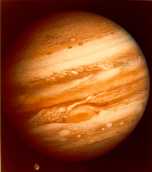
Jupiter

Jupiter is the largest and most massive planet in our Solar System. The total mass of Jupiter is about 2½ times that of all the other planets put together. Jupiter is however a very primitive world with an enviroment deadly to human beings.
Jupiter gives off as infrared radiation about twice as much energy as it receives from the sun. This means that Jupiter has an essential attribute of a star (as the sun) but it's a planet. Jupiter is also one of the brightest stars in the night sky.
Jupiter consistsof mostly hydrogen and helium in liquid form. The density of Jupiter is only 1330 kg/m³ (water=1000 kg/m³).
Planetary Data of Jupiter |
|
| Rotation Period (Equatorial) | 9 h 50 min 30 sec |
| Average distance from sun | 778 300 000 km |
| Sidereal Orbit Period | 4333 days |
| Sidereal Rotation Period | hours |
| Average Orbital Velocity | 13.1 km/sec |
| Radius of Planet (Polar) | 66550 km |
| Radius of Planet (Equatorial) | 70850 km |
| Mass of Planet | 1.899 x 10²7 kg |
| Density of Planet | 1300 kg/m³ |
| Temperature (Upper atmosphere) | -123 ºC |
| Temperature (20000 km into atmosphere) | 11000 ºC |
| Atmosphere | Hydrogen, helium, methane, ammonia, water, carbon monoxide, acetylene, ethane, phosphine, germane |
| Satellites | Io, Europa, Ganymede, Callisto, Leda, Himalia, Lysithea, Elara, Ananke, Carme, Pasiphae, Sinope, Almathea, 1979J3, 1979J2, 1979J1 |
![]()